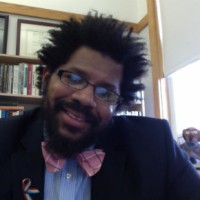Jesus arrives at a New England prep school
In our "Reflections From the Classroom" series, seasoned teachers talk about their experiences walking with students and guiding their learning. This post is the first of two parts showcasing the impact of a unique course taught during January at the Brooks School. Part one introduces Brooks, prep school culture, and the course description for “American Jesus.” Part two will delve into various readings, discussions, and student responses to Jesus in the prep school classroom.
The Brooks School, where I teach, is a traditional elite New England boarding school with roots in the Episcopal tradition. Founded in 1926 and named after Phillips Brooks, a well-regarded Episcopal bishop of Massachusetts, the school defies tradition as it seeks to diversify its faculty and student body. This diversity extends to its spiritual life. Its faculty represents a collection of bright, dedicated, and hardworking people. Like many academic institutions, Brooks began as a single-sex male school, and was slow to become co-educational, which transpired in 1979. New England boarding schools have long held a certain mystique among the American populace, a mystique found in films such as Dead Poets Society and in books such as John Knowles's A Separate Peace.
In recent years, several books have discussed the anthropological nature of boarding schools. Most are contemporary in focus and lack historical analysis on matters of race, LGBTQ issues, and religious diversity. Unlike a number of southern private schools constructed in response to Brown v. Board of Education, or due to the impending conservative perception regarding the moral decay in the United States after Brown, many elite boarding schools sought to educate future leaders for positions of wealth and power by establishing enclaves that have historically purported a sense of Protestant homogeneity.
I teach a course at Brooks called "American Jesus." Due to the school's nature as a member of an exclusive world of education, such a course is risky. In a world with shifting and undefined definitions of being religious and American, the terms Christian and Jesus often invoke fear within a community. Brooks School is no different. Many of its students define themselves as non-practicing Christians and are skeptical of organized religion. However, Brooks does offer courses in religion through its theology department, such as “Human Understanding and the Search for Meaning,” which explores the Abrahamic faiths and Eastern religions. Further, Brooks requires chapel attendance three days per week, with a mission of being inclusive of all community beliefs.
Brooks offers elective courses in January, part of its winter-term program that emphasizes depth over breath. Thus, Brooks welcomes a unique course such as “American Jesus,” which explores the transformative notion of Jesus Christ over the course of U.S. history. The course examines Americans' sense of Jesus Christ as seen through the lens of American Puritan values, popular culture, music, and academics. Television shows such as Family Guy and South Park encapsulate various views of Jesus, as do documentaries on the life of Christ.
“American Jesus” delves into the complexity of race, gender, and sexuality, as a counternarrative to traditional constructs. Moreover, students study Americans’ fascination with hip-hop artists such as the late Tupac Shakur, who included Jesus in his rhythmic sounds and lyrics. Tupac inculcated a sense of lyrical spirit as a representation of black urban suffering. “American Jesus” presents a narrative that introduces Jesus through my lens—an African American from Montgomery, Alabama, on a campus with just a handful of folks that look like me.
Furthermore, students study the literature of American religious historians Edward Blum and Paul Harvey, whose book The Color of Christ asks the question, how can the Son of God be a representative of both white supremacy and racial reconciliation by the 1960s? Students also read Steven Prothero’s American Jesus and John Fea’s Was America Founded as a Christian Nation? Discussions regarding the religious pursuits of popular figures such as Kanye West, W. E. B. Du Bois, and Billy Graham—as well as presidents George W. Bush, Jimmy Carter, and Barack Obama’s sense of American politics and religiosity—aim to showcase political ideology within the confines of the culture wars.
Our weekly feature Then and Now harnesses the expertise of American religious historians who care about the cities of God and the cities of humans. It's published in partnership with the Kripke Center of Creighton University and edited by Edward Carson, Beth Hessel, and John D. Wilsey.






